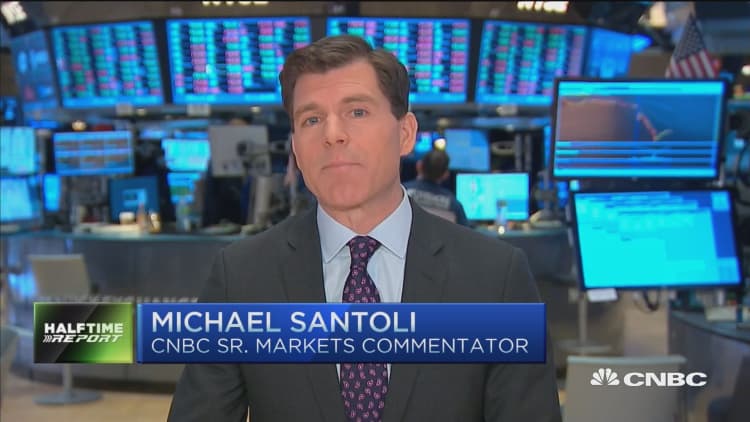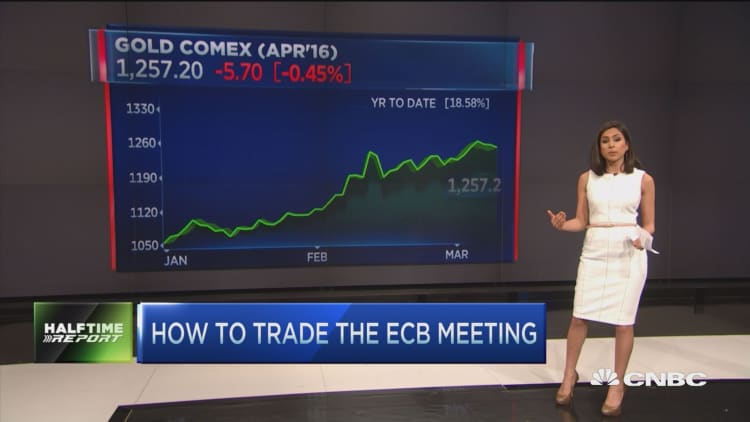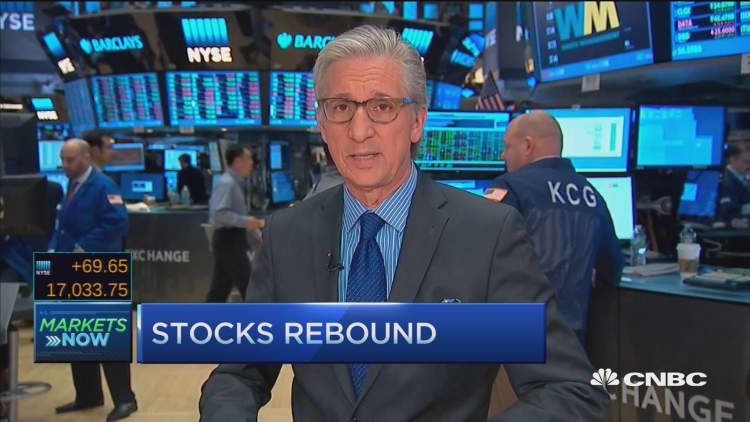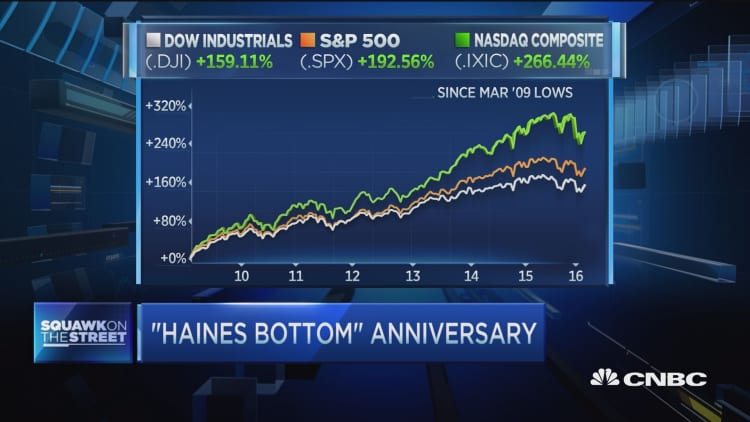



U.S. stocks closed higher in low volume trade Wednesday, helped by a rise in oil prices, as investors awaited Thursday's European Central Bank decision on monetary policy. (Tweet This)
"I think the big focus is how the expectations in the marketplace are going to be met by the announcement tomorrow," said Daniel Deming, managing director at KKM Financial.
ECB President Mario Draghi is expected to announce more stimulative measures, with hopes of expansion of the asset purchase program and a possible further cut to the already negative deposit rate.
The Federal Reserve and Bank of Japan are due to hold meetings next week.
Energy closed 1.5 percent higher, off session highs, to lead S&P 500 advancers. Higher oil prices continued to bring in both short covering and longer-term positioning, traders said.
U.S. crude oil futures settled up $1.79, or 4.90 percent, at $38.29 a barrel, its highest settle since Dec. 4. Oil extended gains after weekly crude oil inventories showed a rise of 3.9 million barrels but a drop of 4.5 million barrels in gasoline inventories.
Hopes of curbing production also supported the rise in oil. An Iraqi oil official told state newspaper Al-Sabah that OPEC and non-OPEC members would meet in Moscow on March 20 to discuss an output freeze. However, Russian Energy Minister Alexander Novak said Wednesday that no time or place had been agreed for such a meeting this month, Reuters reported, citing the Russian TASS news agency.
Robert Pavlik, chief market strategist at Boston Private Wealth, said higher oil prices should have contributed to greater gains in stocks. "I think the ECB meeting is keeping a lid on the stock market. People are just not sure," he said.
Confidence in the effectiveness of monetary policy has waned since Draghi disappointed investors at the ECB's December meeting and the yen strengthened following the Bank of Japan's surprise move to negative rates in late January.
"That leads to a lack of credibility to central banks that adds another layer of uncertainty," said Bryce Doty, senior fixed income manager with Sit Investment Associates.
The major averages initially spiked following the surge in oil, before briefly giving up gains. The Dow Jones industrial average and Nasdaq composite temporarily fell into negative territory.
"We know that this is a week that we overreact to the inputs we get because they're few," said Art Hogan, chief market strategist at Wunderlich Securities.
Amazon recovered much of its intraday losses to close 0.14 percent lower and Apple squeezed out a 0.09 percent gain. The iShares Nasdaq Biotechnology ETF (IBB) closed down 1.15 percent, also above session lows.
Biotechs came under pressure amid a U.S. government health agency proposal that would change the way Medicare compensates doctors who administer drugs in their offices as a way to try to cut drug spending, Reuters said.
Chevron and IBM contributed the most to gains on the Dow, while Goldman Sachs and Nike were the greatest contributors to declines.
"It just feels like the only players in the market are momentum players," Deming said. "They're really short term, just trying to play these nuances and the shifts in sentiment."
The U.S. dollar index reversed to trade a touch lower, while the euro climbed above $1.10. The yen was at 113.29 yen against the greenback. Gold came well off lows after briefly hitting its lowest in almost a week.
Treasury yields were higher, with the at 0.89 percent and the 10-year at 1.88 percent.
The Treasury auctioned $20 billion of 10-year notes at a high yield of 1.895 percent. Demand was the weakest since August, following a poor auction of three-year notes on Tuesday, Reuters said.
Peter Boockvar, chief market analyst at The Lindsey Group, attributed some support to U.S. stocks from gains in European equities ahead of the ECB meeting.
"I think what we've seen over the past month is a bear market rally and what we hear from central bankers over the next week could mark the end of that," he said. To him, the bull market that celebrated its seventh anniversary Wednesday actually ended in the middle of last year.
Read More 7-year bull market may end in a 'blaze of glory'
As of the close Wednesday, the S&P 500 was up 194 percent since the close on March 9, 2009, marking the third-longest bull market in history.
"I think investors are just worrying how long is the bull market going to keep going," said Mike Bailey, director of research at FBB Capital Partners. "If you set aside equities and look at fundamentals, they're looking a bit better than maybe stocks might have indicated in February."
Dow futures briefly gained 100 points ahead of the open, following a lower close Tuesday that broke a five-day winning streak. The S&P 500 and Nasdaq composite both fell more than 1 percent.
"The relief rally is persistent and reflects improved intermediate-term momentum. However, we would be wary of a loss of short-term momentum given widespread short-term overbought conditions," BTIG Chief Technical Strategist Katie Stockton said in a note.
In economic news, weekly mortgage application volume increased 0.2 percent on a seasonally adjusted basis, according to the Mortgage Bankers Association.
Read More'Armageddon bull market' continues to beat the odds
Wholesale inventories rose 0.3 percent in January, while sales declined 1.3 percent.
"The buildup in inventories is not good news because wholesale inventories are plentiful at this time. That could raise suspicion in face of economic growth going forward," said Peter Cardillo, chief market economist at First Standard Financial.
Following the data, CNBC's first-quarter GDP Rapid Update ticked 0.1 percent higher to 2.2 percent.
The Atlanta Federal Reserve's GDPNow forecast model was unchanged from Friday's estimate, showing the economy was on track to grow at 2.2 percent in the first quarter.
Major U.S. Indexes
European stocks came off session highs to end about half a percent higher. The STOXX Europe 600 Banks index closed 0.18 percent higher.
Asian stocks closed mostly lower, with the Shanghai composite off about 1.3 percent and the Nikkei 225 0.8 percent lower.
Read More Early movers: GIS, VRX, CRWN, EXPR, DRI, LL, CBS, ROST, CMG & more
The Dow Jones industrial average closed up 36.26 points, or 0.21 percent, at 17,000.36, with Chevron leading advancers and Nike the greatest laggard.
The closed up 10.00 points, or 0.51 percent, at 1,989.26, with energy leading all sectors except telecommunications higher.
The Nasdaq composite closed up 25.55 points, or 0.55 percent, at 4,674.38.
The CBOE Volatility Index (VIX), widely considered the best gauge of fear in the market, held near 18.5.
About seven stocks advanced for every three decliners on the New York Stock Exchange, with an exchange volume of 957 million and a composite volume of 4.0 billion.
As of the close, trade volume across the exchanges was on pace for the fifth-lowest of the year so far.
Gold futures for April delivery settled down $5.50 at $1,257.40 an ounce.
Correction: This story has been updated to reflect the final close on the STOXX Europe 600 Banks Index showed a gain of 0.18 percent. The figure was misstated in an earlier version.
On tap this week:
Thursday
European Central Bank meeting
8:30 a.m. Weekly claims
10 a.m. Quarterly Services Survey
10:30 a.m.: Natural gas inventories
1 p.m. $12 billion 30-year bonds auction
2 p.m. Federal budget
Friday
8:30 a.m. Import prices
1 p.m.: Oil rig count
*Planner subject to change.
More From CNBC.com:






